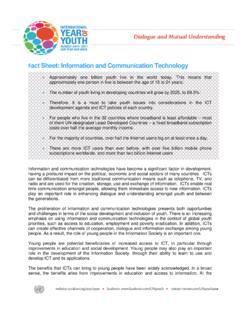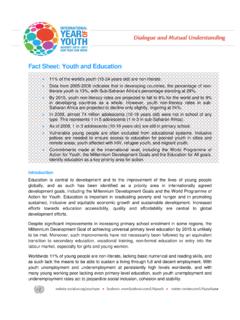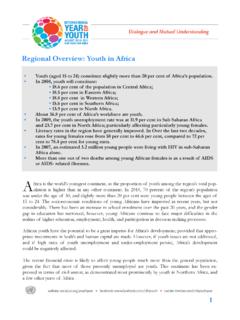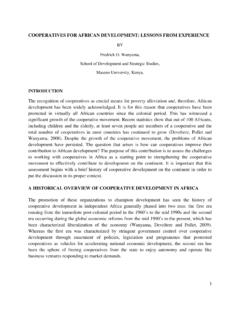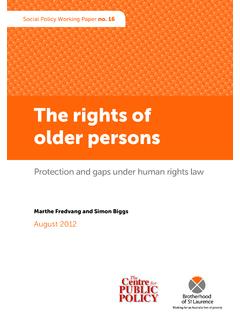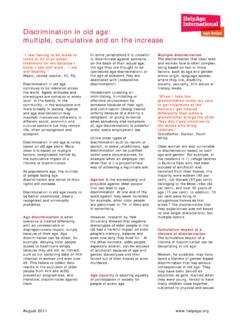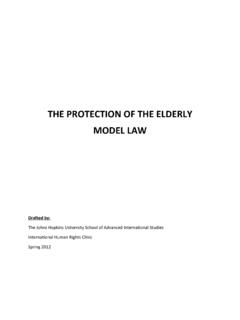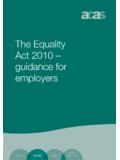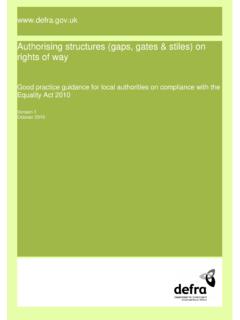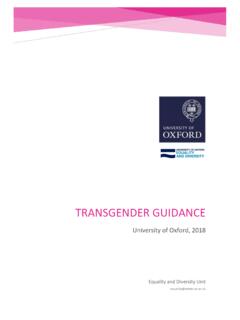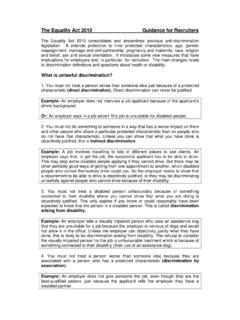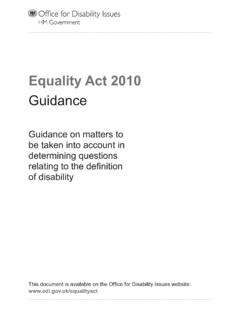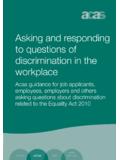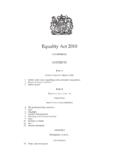Transcription of UN Open Ended Working Group on Ageing United Kingdom ...
1 1 UN Open Ended Working Group on Ageing United Kingdom policy contribution equality and non-discrimination 1) Does your country s constitution and/or legislation (a) guarantee equality explicitly for older persons or people of all ages and (b) forbid discrimination explicitly on the basis of age? If so, how is the right to equality and non-discrimination defined? The equality Act 2010 (the 2010 Act) provides robust protection against direct and indirect age discrimination in employment for people aged 16 and over and in the provision of services to those aged 18 and over. However, it permits differential treatment in employment if there is objective justification and it is a proportionate means to achieving a legitimate aim, and in the provision of some goods and services (see below). The equality and Human Rights Commission (EHRC), an independent statutory body which has the power to take enforcement action in respect of a breach of any of the 2010 Act s provisions, has produced specific guidance on age discrimination.
2 The EHRC also carries out periodic research to determine how policies are being integrated to encourage full participation, including of older persons, in the workplace, and has published a Statutory Code of Practice and age-specific guidance for service providers and service users on their duties/rights under the 2010 Act. The UK s Government Equalities Office has published age-specific guidance for service providers, small businesses, private clubs, and holiday providers. The NHS Constitution guarantees a comprehensive service available to all, irrespective of age, and explicitly recognises the right not to be unlawfully discriminated against in the provision of NHS services including on grounds of age. Public sector bodies have a duty to ensure that equality issues are proactively considered to remove or minimise disadvantage, meet the needs of, and encourage greater participation in public life by, those with protected characteristics, including older people.
3 Local authorities must ensure their commissioning practices and the services delivered on their behalf comply with the equality Act 2010 and do not discriminate against people with protected characteristics. 2) Does your country produce information about discrimination against older persons in the following or other areas? If so, what are the main findings? (Employment, Access to goods and services, Social protection, Health care, Social care, Justice, inheritance, Decision-making and autonomy, living environment, Other areas) The Employment Tribunal Service (ETS) publishes quarterly/annual statistics of all discrimination complaints, including age discrimination, but these are not broken down 2 by the age of claimants. In addition, the ETS publishes its rulings in relation to individual cases. The English Housing Survey 2014-15 on Housing for Older People indicated that the majority of older households were satisfied with their accommodation (94% compared to 86% of younger households).
4 Living standards for pensioners have been improving steadily for many years. Despite a rise in relative low income, the proportion of this Group living in a low income household remains low by historical standards. Thanks to the triple lock (which increases the basic state pension each year by inflation, earnings, or , whichever is highest), by April 2017 the basic state pension was expected to be over 1200 a year higher than it was in April 2010 . The basic state pension it is now at one of its highest rates relative to earnings for over two decades, reversing a trend of decline between 1997 and 2010 . The UK does not produce information about discrimination against older persons in inheritance cases. Information about inheritance procedures is available on the UK Government website (for example, ) and from many other sources, such as charities and legal advisors. The law of England and Wales provides that a will made without testamentary intent is not a valid will and personal representatives of deceased persons can be held to account by persons interested in the estate.
5 These protections are available to everyone. 3) Is there information available about inequality of opportunities or outcomes experienced by older persons in the following areas? (Availability of, access to and quality of health care services; Financial services) See below. 4) Are there any areas where differential treatment based on old age is explicitly justified? ( Access to goods, Mandatory age of retirement, Age limits in financial services and products, Age-based benefits). The equality Act 2010 (Age Exceptions Order) 2012 provides a number of specific exceptions to the ban on age discrimination in the provision of goods and services. These exceptions permit differential treatment based on age in areas including financial services/insurance, concessionary services, age-restricted sales, and holidays. Such differential treatment may either be advantageous or disadvantageous to the older customer, depending on the circumstances.
6 Research has indicated that no age groups are specifically excluded from the insurance market, but age does make a difference to matters such as price, special offers, the application process and distribution channels. These differences can be explained by the fact that prices reflect the risk and cost associated with providing the service to people of different ages, and also market specialisation by providers. While the equality Act 2010 does not prohibit insurers use of age limits, we recognise that older customers aren t always able to obtain motor and travel insurance from all providers. To address this, we have an agreement in place with insurers to ensure that where an insurer 3 cannot offer cover due to upper age limits on their policies, it will refer the customer to another insurer who can provide cover, or to an appropriate signposting service. Following the abolition of the default retirement age, it is now up to each employer to decide (in accordance with the provisions of the equality Act 2010 ) whether to have a fixed occupational retirement age, or whether to make decisions on a case by case basis.
7 Pension Credit is an income-related benefit made up of 2 parts: Guarantee Credit tops up an individual s weekly income if it is below a prescribed ceiling, and Savings Credit is an extra payment for individuals who saved some money towards their retirement. To qualify for Guarantee Credit individuals or their partners must have reached the qualifying age for Pension Credit (which is gradually increasing to 66). To qualify for the extra Savings Credit individuals or their partners must be 65 or over. 4 Neglect, Violence and Abuse 1) In your country, are there specific surveys or studies (from governments, non-governmental or academic sources) on violence, abuse and neglect experienced by older persons? ------- 2a) What forms of violence, abuse and neglect ( physical, physiological, sexual, financial and other) are registered? What is the setting in which they occur ( residential and non-residential)? Is there information about the type of perpetrators?
8 -------- 2b) Does violence, abuse and neglect particularly affect specific groups of older persons? If so, which groups and how? ------- 3) Does you country s legislation explicitly address issues of violence, abuse and neglect against older persons? If not, what legislation applies to such issues in the context of older persons? Does this legislation sufficiently address the full range of violence against older persons? The UK is committed to protecting those at risk of abuse and neglect. We want to see a focused and effective safeguarding system, where harm or risk of harm is identified, acted upon effectively and ultimately prevented. The UK has introduced tougher inspections of care services and given councils access to up to billion of dedicated funding for social care, and will continue to challenge local authorities that do not fulfil their duties under the Care Act. The Care Act requires that each local authority must: - make enquiries, or cause others to do so, if it believes an adult is experiencing, or is at risk of, abuse or neglect.
9 An enquiry should establish whether any action needs to be taken to prevent or stop abuse or neglect and if so, by whom. - set up a Safeguarding Adults Board (SAB) singly or jointly with another local authority. We have also made changes to help services recruit people with the right values and skills, introducing a care certificate for front-line staff to ensure older and vulnerable people receive the high quality care they deserve. This includes a Fit & Proper Person Test to hold directors to account for care. In addition, we have introduced new criminal offences of ill treatment and wilful neglect for care workers. 5 Any organisation that uses volunteers must ensure that appropriate checks and assessments of risk are carried out when deciding who to employ. Employers, including voluntary organisations may, subject to eligibility, obtain criminal records checks from the Disclosure and Barring Service. Organisations should also ensure that appropriate supervision is provided for volunteers.
10 The UK is leading the way internationally in efforts to tackle violence against women and girls (VAWG) in all its forms. This naturally includes older women. We have undertaken a significant amount of work to ensure that victims are supported, perpetrators are brought to justice, and that we do all we can to prevent these crimes happening in the first place. We have introduced new laws and tools to protect victims of VAWG including: the criminalisation of forced marriage, two new stalking laws, the national roll-out of Domestic Violence Protection Orders and the Domestic Violence Disclosure Scheme, and a new offence of domestic abuse covering controlling and coercive behaviour. Domestic Violence Protection Orders (DVPOs) and the Domestic Violence Disclosure Scheme (DVDS) have been rolled out across England and Wales from March 2014. DVPOs can prevent the perpetrator from returning to a residence and from having contact with the victim for up to 28 days.

